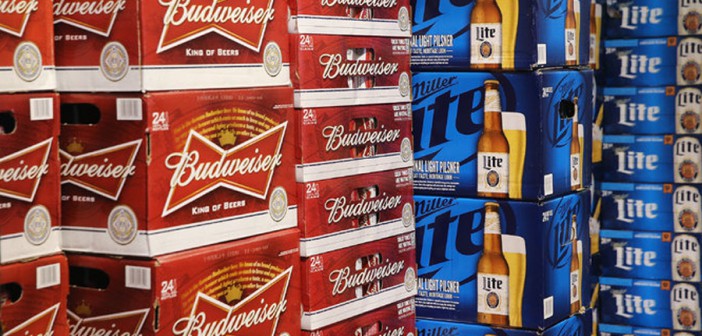Anheuser-Busch InBev Approaches SABMiller on Possible Takeover
At a time when investors are nervous and antitrust regulators are suspicious, the prospect of a $100 billion-plus merger on the horizon may seem remote.
Yet in a bold step toward creating a global colossus in beer, Anheuser-Busch InBev said on Wednesday that it had approached its rival SABMiller about a potential takeover.
If successful, a merger of the companies, the world’s biggest brewers, would put some of the most popular beers under one roof: Anheuser-Busch InBev’s Budweiser, Corona and Stella Artois would join Miller Lite, Peroni and Grolsch from SABMiller.
Combined, the companies would have $69 billion in annual revenue and command of 30 percent of global beer sales, according to the research firms Euromonitor International and IBISWorld.
And a deal would be the crest of a wave of consolidation that has swept through the global beer industry this century. The push to get bigger was set off by the Brazilian deal makers behind the investment firm 3G Capital, whose affiliate is Anheuser-Busch InBev’s largest shareholder.
The founding partners of 3G have already created the world’s largest brewer, using AmBev, their Brazilian company, to merge with InterBrew of Belgium and then orchestrate a surprise takeover of Anheuser-Busch, in 2008. Under the motto “dream big,” 3G has subsequently engineered a series of huge deals, for Burger King, H.J. Heinz and other companies.
Will a big beer deal be part of that dream? High hurdles await.
For one, no talks are underway and no offer is on the table. Anheuser-Busch InBev has until Oct. 14 to make one, under British takeover rules — SABMiller is based in London. And the financing for a takeover could be daunting. After its shares surged 20 percent in London trading on Wednesday, SABMiller had a market value of $90 billion. Any offer probably would exceed $103 billion.
Anheuser-Busch InBev must also win over two of SABMiller’s biggest investors: Altria, the cigarette maker, and the Santo Domingos, one of the wealthiest families in Colombia. Together, they own 41 percent of SABMiller.
The highest hurdle will be antitrust regulators, especially those in Washington and Beijing. In the United States, the two companies account for about three-quarters of the beer market.
“The competitive harm is pretty scary,” said Diana Moss, the president of the American Antitrust Institute. “The concern is higher prices for consumers.”
To win approval, from the Justice Department in the United States and regulators in Europe and China, the companies would almost certainly have to sell some brands or assets, including SABMiller’s 58 percent stake in its Miller Coors joint venture in the United States, and its share of the CR Snow joint venture that owns Snow, China’s best-selling beer brand.
The risks of undertaking a takeover, however, pale in comparison with the challenges for mass-market beer brands. Sales have fallen in established markets like the United States and Europe as their customers have moved to wine and, particularly among younger drinkers, to craft brews.
“As the craft movement is coming of age and solidifies its position as a key disruption force within beer and the entire alcohol industry,” said Spiros Malandrakis, a senior analyst at Euromonitor International, corporate consolidation “will remain largely irrelevant to the scores of millennials seeking alternatives to big beer’s offerings.”
That has prompted the world’s biggest brewers to cast about for additional ways to jolt their growth.
Buying SABMiller would give Anheuser-Busch InBev more exposure to faster-growing emerging markets, particularly in Latin American countries like Colombia, Peru and Ecuador.
Moreover, SABMiller’s shares have fallen more than 11 percent in the last 12 months, making the company more vulnerable to a takeover.
“We are not surprised that ABI would be interested in buying SAB to create MegaBrew,” Trevor Stirling, an analyst with Sanford C. Bernstein & Company, wrote in a research note on Wednesday.
In a statement on Wednesday, Anheuser-Busch InBev — already the world’s largest brewer — confirmed that it had approached “SABMiller’s board of directors regarding a combination of the two companies,” and said that it intended to work with the board “toward a recommended transaction.”
SABMiller said that its directors had no further details about the proposal, and advised shareholders “to retain their shares and to take no action.”
“The board of SABMiller will review and respond as appropriate to any proposal which might be made,” SABMiller said in a statement. “There can be no certainty that an offer will be made, or as to the terms on which any offer might be made.”
A year ago, SABMiller was rebuffed in its takeover approach to Heineken of the Netherlands.
Analysts and investors have already speculated that a potential takeover of SABMiller would prompt a huge number of follow-on deals, as the two companies shed assets to win regulatory approval.
One almost certain demand from the United States Justice Department, according to analysts: dissolving MillerCoors, the joint venture that SABMiller formed with Molson Coors in 2008 to combine their American operations.
That partnership owns several major brands, including Miller Lite, Coors Lite and Blue Moon.
Taking control of MillerCoors could yield hundreds of millions of dollars in cost savings for Molson Coors, analysts have estimated. And it could give Molson Coors more control over the brewer’s operations in the United States, its biggest market.
Shares of Molson Coors jumped more than 14 percent on Wednesday at the prospect of the company buying out SABMiller’s stake in the venture.
Heineken could challenge Molson Coors for the SABMiller stake, or pursue other assets like SABMiller’s African operations excluding those in South Africa, analysts at Nomura wrote in a research note on Wednesday.
Advising SABMiller, which is based in London, are Robey Warshaw, JPMorgan Chase and Morgan Stanley. Lazard and the law firm Freshfields Bruckhaus Deringer are advising Anheuser-Busch InBev, which is based in Belgium.




